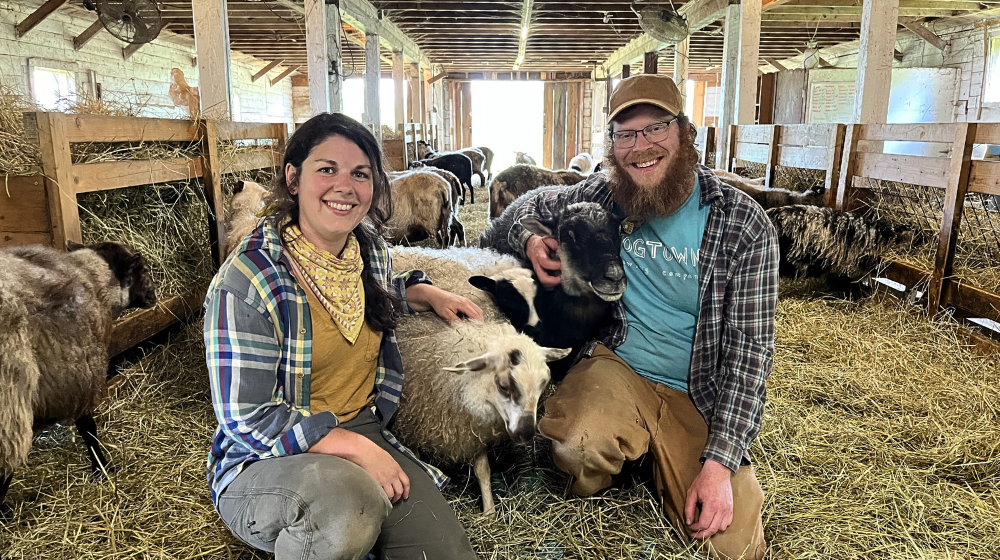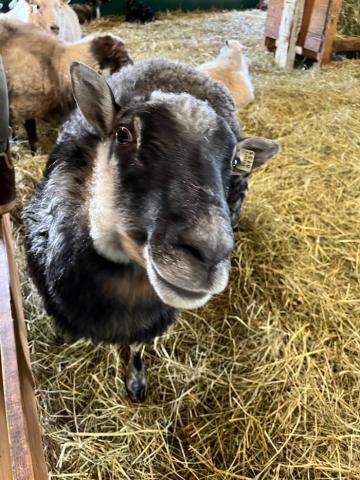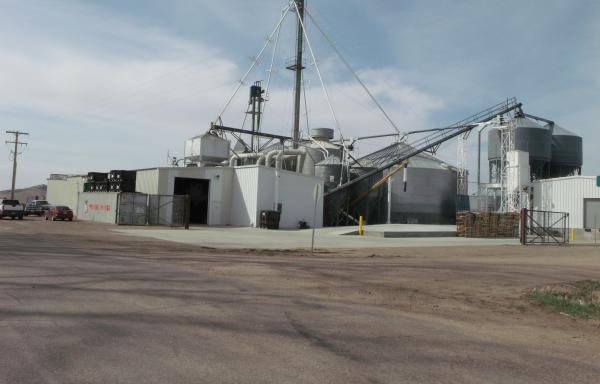
Elizabeth Goundie and Josh Emerman are the co-founders of Moorit Hill Farm and Fiber in Troy, Maine. They came to Central Maine by a circuitous route, purchasing the property in 2017. Just seven years later, the young farmers are not only tending more than 70 sheep but also providing a vital service to small- and mid-scale fiber producers by operating a custom fiber mill. They found many partners to help them learn, plan, and expand in Maine’s supportive resource network. USDA Rural Development was an important component in that network, providing a grant to help the business transition to solar energy.
Having grown up elsewhere in the Northeast, both Josh and Elizabeth attended college in Maine before pursuing careers in marine biology. When they decided to farm, it seemed a natural decision to return to Maine. After an extensive search, they found the property they ultimately purchased. It was somewhat distressed but had large barns and 70 acres. They took the leap and got started, aiming to learn and explore options in every way possible.

As is the case for many beginning farmers, the University of Maine Cooperative Extension proved to be an important early resource. They attended a free workshop where they learned about Icelandic sheep. Soon they had purchased four, and the following year added another four. “The University of Maine was an amazing resource for us when we were getting started,” says Elizabeth. “They provided a safety net of knowledge and experience when we were beginners.”
As the Moorit Hill Farm herd began to grow, Josh and Elizabeth ventured into breeding. They also recognized how beautiful their sheep’s wool was and began learning about working with the fiber. For a couple of years, they took their wool to be processed at the former Aroostook Fiberworks in Ashland. Eventually, the owner reached out to say that he wanted to step away from the business. Ultimately, they bought his equipment. The equipment manufacturer, family-owned Belfast Mini Mills, LLC, proved to be another important resource. A technician spent a week setting up the equipment and providing training them intensively, and the Prince Edward Island company has provided technical support ever since. Moorit Hill Farm and Fiber officially began custom processing fiber in January 2023.
There are just a handful of fiber processors in Maine and only three process small batches of fiber into yarn. Small batch processing is a vital service for people with a few dozen sheep or less. The fact that the Moorit Hill farmers were willing to take on the milling business when Aroostook Fiberworks closed was big news for the small- and mid-scale fiber producers. For the farm, it meant another opportunity to diversify their business and potentially become more resilient.
Unfortunately, right around that time, electricity prices in Maine started to rise significantly. Josh and Elizabeth were running the milling equipment four or more days per week year-round, and it all ran on electricity. Their costs were rising in a sector that already had tight margins. But they weren’t unprepared. They had worked with the Small Business Administration and Coastal Enterprises Inc. to develop a business plan prior to financing their purchase of the milling equipment. The business advisors they partnered with at those organizations were “very helpful and transparent,” said Elizabeth. Armed with the plan, they knew what the business could afford in monthly payments.
Soon they began working with SolarLogix LLC, a beneficial electrification company based in nearby Belfast, Maine. The company determined it would take a 41kW solar array to provide the energy the farm and mill would require, at a cost of almost $130K. They wanted to be sure their monthly payment on the solar installation wasn’t more than their utility bill would otherwise be. That way they could afford the cost and ultimately own their own generation capacity. SolarLogix suggested they apply for a grant from USDA Rural Development. With assistance from the company, they applied to the program in 2023, and by fall learned that they had won a $65K grant that would cover about half the cost of their project. With a loan from CEI to cover the remainder, they were eager to start the project.
The solar panels were installed on the roof of their sheep barn in February of 2024. (The SolarLogix installation team worked amidst snow piles, taking care not to be noisy or otherwise disrupt dozens of sheep who were about to start lambing soon.) The result is a project that is not only saving the business money but dramatically reduces its carbon footprint as well. Their customers appreciate their efforts, and using clean energy ensures the wool they produce truly is an earth-friendly product.
Concludes Josh, “At Moorit Hill Farm, we strive to work with the land, using regenerative agricultural practices wherever possible. When we opened our fiber mill, we knew we needed to do something about the high energy usage. We pursued solar power to help offset this usage and align our values with our business. The USDA REAP program made this possible, as it would have been otherwise financially unobtainable. Today we can happily say that we are powering our farm entirely using solar energy.”
Where to find Moorit Hill Farm and Fiber products:
Moorit Hill Farm and Fiber primarily sells its products at the Blue Hill Farmers’ Market, as well as at special events like the Maine Fiber Frolic. (The farmers plan to wholesale their yarn in the future and are currently looking for potential retail partners.) Find them with a variety of yarns, hand-knit hats, sheepskins, and cuts of lamb at the market from 9-11:30 every Saturday through October. Their products can also be purchased directly from their online shop. Goundie notes that the farm has a growing following of gourmands who seek out Icelandic lamb for its delicate flavor. To help devotees stock up, they are taking orders now (online or at the market) for whole lamb shares that will be ready for pick up at the farm in October.
“At the Small Business Administration we are happy to see Moorit Hill Farm and Fiber use the REAP grant to invest in their business and put sustainability at the forefront of their growth. They received advising and a loan through SBA programs in 2022. By using USDA programs to expand their business and diversify their products, Moorit Hill Farm reflects the partnership between the USDA and SBA here in Maine. We hope to see many more small farms and rural businesses take advantage of the strong support system that the SBA and USDA can provide as they start and grow all across the state.”
- Small Business Administration Maine District Director Diane Sturgeon

